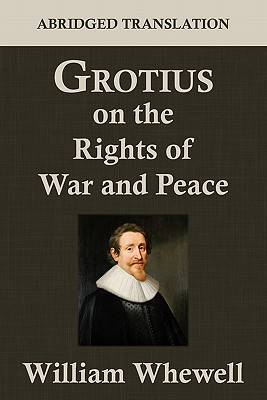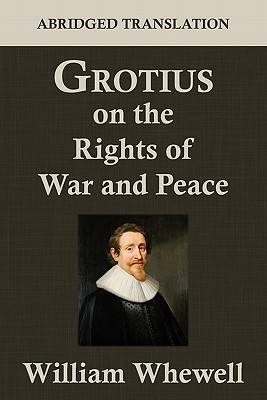
- Retrait gratuit dans votre magasin Club
- 7.000.000 titres dans notre catalogue
- Payer en toute sécurité
- Toujours un magasin près de chez vous
- Retrait gratuit dans votre magasin Club
- 7.000.0000 titres dans notre catalogue
- Payer en toute sécurité
- Toujours un magasin près de chez vous
Grotius on the Rights of War and Peace
An Abridged Translation. Edited for the Syndics of the University Press
Hugo Grotius
Livre broché | Anglais
32,45 €
+ 64 points
Format
Description
Reprint of the sole edition of this translation. In this momentous work Grotius describes the situations in which war is a valid tool of law enforcement and outlines the principles of armed combat. Though based on Christian natural law, Grotius advanced the novel argument that his system would still be valid if it lacked a divine basis. In this regard he pointed to the future by moving international law in a secular direction. This edition was abridged by removing most of the quotations from "ancient historians, orators, philosophers, and poets," which are identified in footnotes. As Whewell states in the preface, they tended to "confuse the subject, obscure the reasoning, and weary the reader." By removing them he enhanced clarity and reduced the bulk of the work by "more than a half" (vi). Hugo Grotius [1583-1645], generally acknowledged as the founder of international law, was an influential Dutch jurist, philosopher and theologian. Originally published in 1625, De Jure Belli ac Pacis (On the Law of War and Peace, translated by Whewell as On the Rights of War and Peace) is widely considered to be the first modern treatise on international law. William Whewell [1794-1866] wrote on numerous subjects and is known for the breadth of his endeavors, and his influence on the philosophy of science. He was one of the founding members and an early president of the British Association for the Advancement of Science, a fellow of the Royal Society, president of the Geological Society, and longtime Master of Trinity College, Cambridge.
Spécifications
Parties prenantes
- Auteur(s) :
- Traducteur(s):
- Editeur:
Contenu
- Nombre de pages :
- 528
- Langue:
- Anglais
Caractéristiques
- EAN:
- 9781616191511
- Date de parution :
- 23-05-11
- Format:
- Livre broché
- Format numérique:
- Trade paperback (VS)
- Dimensions :
- 152 mm x 229 mm
- Poids :
- 766 g

Les avis
Nous publions uniquement les avis qui respectent les conditions requises. Consultez nos conditions pour les avis.






